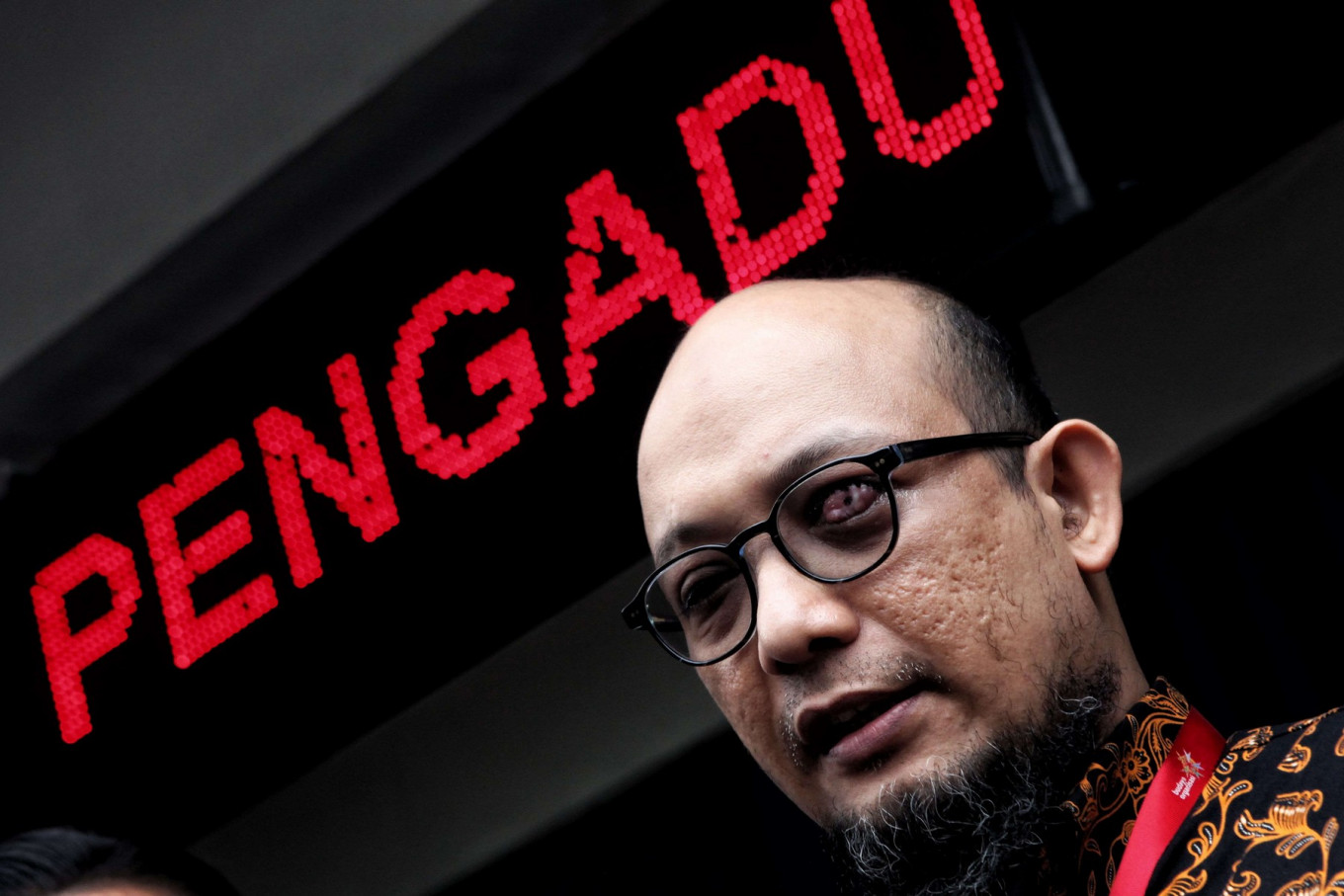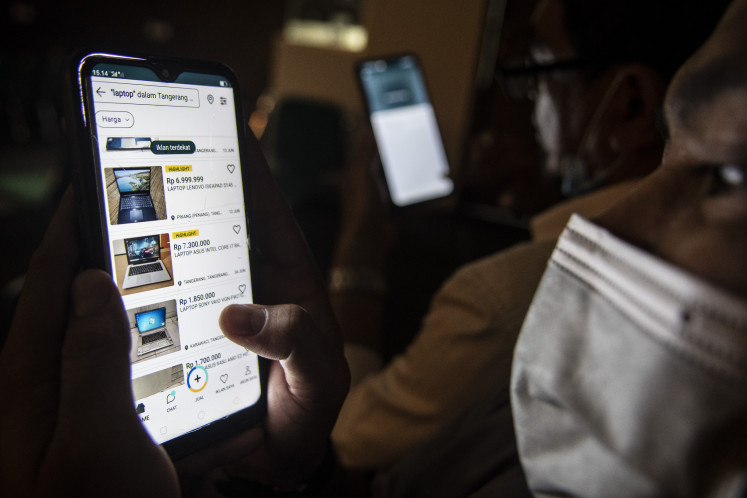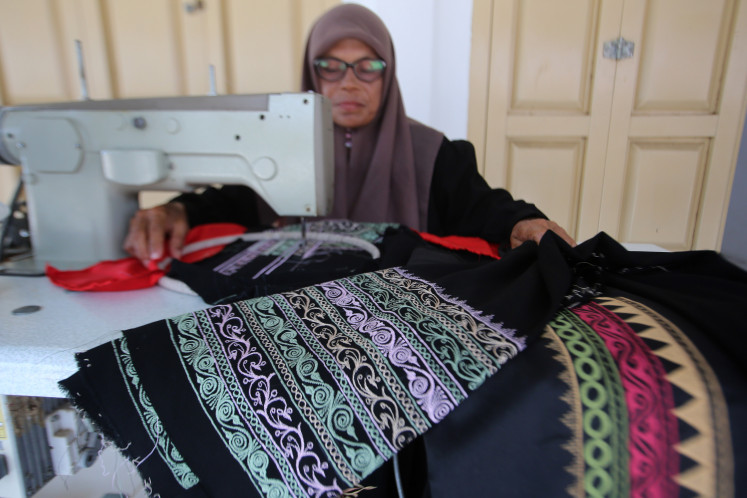Popular Reads
Top Results
Can't find what you're looking for?
View all search resultsPopular Reads
Top Results
Can't find what you're looking for?
View all search resultsKPK has survived assaults before. This time its luck may have run out
With President Joko “Jokowi” Widodo making very little effort to protect the KPK —his instruction to reinstate top investigators at risk of being laid-off has largely been ignored by the KPK leadership—it is likely that the agency will end up being a paper tiger and rendered ineffective.
Change text size
Gift Premium Articles
to Anyone
 Corruption Eradication Commission (KPK) investigator Novel Baswedan speaks to the press after meeting with the Prosecutors Commission on July 2, 2020. The meeting was held to discuss the one-year prison sentence demanded by prosecutors for two police officers allegedly involved in the acid attack on Novel in April 2017. JP/Seto Wardhana (JP/Seto Wardhana)
Corruption Eradication Commission (KPK) investigator Novel Baswedan speaks to the press after meeting with the Prosecutors Commission on July 2, 2020. The meeting was held to discuss the one-year prison sentence demanded by prosecutors for two police officers allegedly involved in the acid attack on Novel in April 2017. JP/Seto Wardhana (JP/Seto Wardhana)
T
he planned dismissal of dozens of Corruption Eradication Commission (KPK) staff under the pretext of nationalism is the latest in a long succession of efforts to weaken the antigraft body.
With President Joko “Jokowi” Widodo making very little effort to protect the KPK —his instruction to reinstate top investigators at risk of being laid-off has largely been ignored by the KPK leadership—it is likely that the agency will end up being a paper tiger and rendered ineffective.
And while past efforts to weaken the KPK have been met with fierce resistance, both from politicians and civil society, today we only hear crickets and it is highly likely that the KPK saga will end not with a bang but with a whimper.
Some have argued that with regard to the current crisis plaguing the KPK, the reason we have not seen a replay of the “Gecko vs Crocodile” outpouring of support from the public both on social media and on the streets, is because of the success of a massive social media campaign against the institution.
In the past few years, we have seen a huge online campaign carried out to paint top KPK investigators like Novel Baswedan as Muslim fundamentalists, or “Taliban”, hell-bent on fighting corruption in the name of Islam. We can trace the campaign back to an essay and series of tweets made by pro-Jokowi buzzer Denny Siregar, who called for the removal of a group of KPK cingkrang, a reference to the cut-off pants often worn by conservative Muslim men.
Others have put the blame for the current turmoil at the KPK on the incumbent batch of leaders of the antigraft body, especially chairman Firli Bahuri, a former police general, whom antigraft activists accuse of being parachuted in to dismantle the institution from within.
Firli has long been seen as a “problematic” figure with a questionable track record and many have cast doubt on his ability to lead an institution with a stellar history like the KPK. If anything, he may have his own motive for taming the institution he now leads, given that the antigraft body itself flagged him for a long list of ethics-violation allegations.
The fact that President Jokowi has done very little to defend the KPK from the latest onslaught has led many to compare him with former president Susilo Bambang Yudhoyono, who during the Gecko vs Crocodile episode had been out front in defending the institution.
The contrast here could not be starker. While Yudhoyono was an image-obsessed president who wanted to project a benign image, President Jokowi could be seen as a pragmatist who operates mostly for the sake of political expediency.
Yet, focusing on presidential politics, individual characters like Firli or a social media campaign-- or the lack of one when it comes to rallying support for the KPK--obscures the big picture of what the KPK is really up against this time and indeed ever since it was established in 2003.
By whatever metrics used to judge its performance, the KPK has without doubt been a success story and if the ongoing turmoil spells the end the KPK as we know it, it could be because the agency became the victim of its own success.
Since its inception, the KPK has arrested no fewer than 13 government ministers, with the latest being former social affairs minister Juliari Batubara, the third social affairs minister to be booked for graft. Before Juliari, we had high-profile ministers like Idrus Marham, Andi Mallarangeng, Suryadharma Ali and Bachtiar Chamsyah.
These ministers may have held different portfolios but most of them represented political parties, with some of them holding key positions in their respective parties, like Suryadharma who once served as chairman of the United Development Party (PPP) and Juliari as treasurer of the Indonesian Democratic Party of Struggle (PDI-P).
The KPK had no qualms about targeting politicians, and investigators like Novel were relentless in their prosecution of big political names. In 2017, KPK investigators arrested then Golkar Party chairman and speaker of the House of Representatives Setya Novanto, arguably one of the country’s most powerful politicians for his alleged role in the e-ID graft case.
Three years earlier, the KPK nabbed Anas Urbaningrum, chairman of the Democratic Party, which at the time was leader of the ruling coalition of then-president Yudhoyono.
The last major political party leader to be arrested by the antigraft body was then PPP chairman M. Romahurmuziy, one of key figures in President Jokowi’s ruling coalition, who once was tipped to become his running mate in the 2019 presidential election.
And then there was the KPK investigators' penchant for rounding up lawmakers serving in the House. In 2011, KPK investigators arrested 25 legislators serving in the 2004-2009 term and charged them with bribery.
So basically, the KPK launched many sustained attacks against the bedrock foundation of the post-Reform political system itself, a system sustained by what one analyst described as a “lucrative rent-seeking opportunity” and “party-based patronage network”
It was, therefore, only a matter of when, not if, the empire finally struck back, and the attack has been relentless.
We can trace back the first attempt to amend the 2002 Corruption Law to 2015 when political factions at the House floated the idea of drafting a limited revision to the law.
The seeds of the KPK’s undoing were planted long ago and President Jokowi’s second term has given it enough oxygen to thrive.
The bruising battle for the 2019 presidential election has left Jokowi with little option but to allow almost all political parties to bring their party-based political network into the government in exchange for political stability.
And this not only deepens the swamp that the KPK is trying to drain, but also allows them to get access to the political, legal and technological tools to emasculate the KPK.
This time it might work.
***
The writer is editor-in-chief of The Jakarta Post









